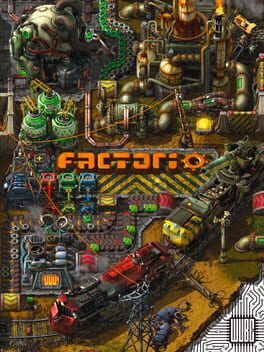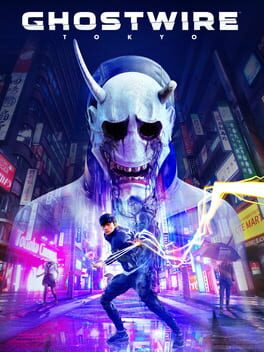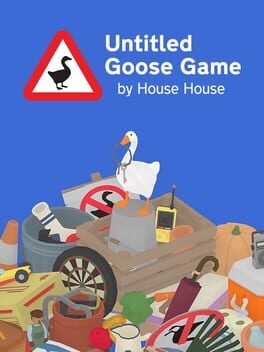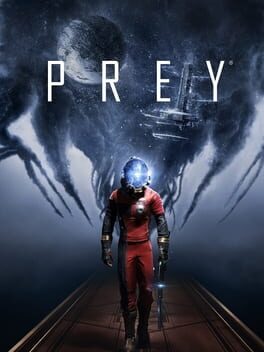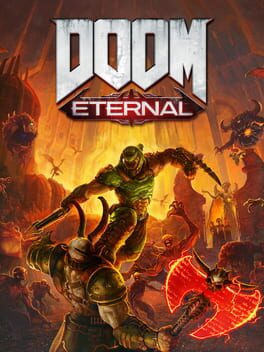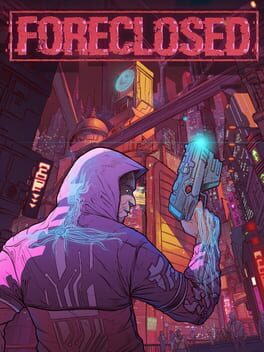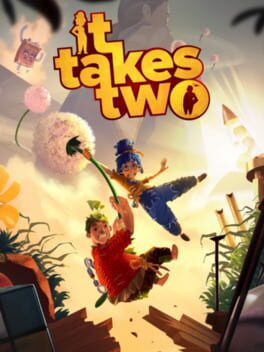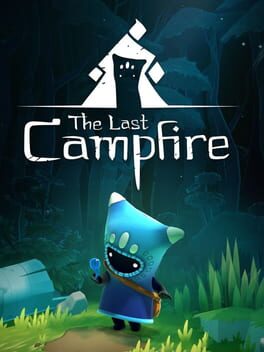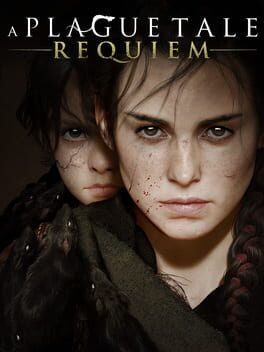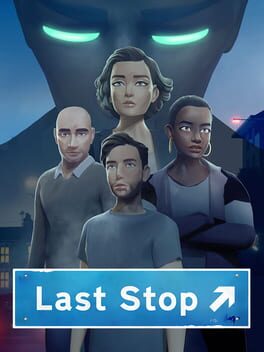OneBadMouse
2022
2022
I love Brotato. Simple. Maybe 16 hours in and just starting to get a handle on the different builds, but make plenty of mistakes. Slow progress, but rarely frustrating. Great fun.
Update after 50 hours: just got all 83 achievements. I love this game.
Update after 125 hours: gold level on all characters. One of my all time favourites. Get the restart wave mod if you're struggling, or if you just want to practice the elite fights.
Update after 50 hours: just got all 83 achievements. I love this game.
Update after 125 hours: gold level on all characters. One of my all time favourites. Get the restart wave mod if you're struggling, or if you just want to practice the elite fights.
2021
Abandoned after 90 mins for which I'm sad. The story premise and worldbuilding was pretty immersive and had a hint of the sublime and the epic. I got a real sense of grandeur and found myself in a pivotal moment in a fictional history. But there were a few moments where my companion wrecked it for me. He seemingly knew everything about the planet and it's inhabitants the moment we arrived at the surface, with zero excitement or surprise at the flora and fauna. It kind of ruined the sense of discovery. Overall though it was the flight control that ruined it. It was almost as though you were given a basic flight sim and then had to work to stop it going poorly, rather than working to make it fun.
A lot of thought went into the game, I'm sure, and I'm sorry it didn't quite work out.
A lot of thought went into the game, I'm sure, and I'm sorry it didn't quite work out.
2023
Please do not read this before playing. I don't want to point something out only for it to alter your experience of the game. I'm jaded and grumpy and have different expectations to how I expect most people approach games such as this. This is more a rant about the state of open world action games than Atomic Heart itself.
Atomic Heart opens with this glorious, utopian cityscape within which the player is just a passenger on a Disney ride. The imagery is rich and detailed and it looks good. But I'm quickly reminded, as I have been many times recently, that graphics in much game development has surpassed the other elements, many of which draw you out of the illusion, breaking the suspension of disbelief.
I went into Atomic Heart with an open mind. I'm a bit cynical about these games, but thought I'd be positive and try and let it win me over. Almost right away though, I'm reminded of why this genre has not only gotten stale, but gone nowhere in the last decade beyond better graphics. One of the first 'encounters' is a robot tour guide telling some NPCs about the city. A great conceit for telling the player about the city. Except, just before you pass by the group the dialogue abruptly stops and the animation continues. This isn't a bug. This is poor direction. If this were a film then the director and their team would ensure that everything in frame was realistic. This may sound like nit-picking, but that's my point. You have to be dedicated to the minutiae to create a fantasy. One little thing like that can be like a pin to your immersion-bubble. People complain about frame rate drops reminding you that you're in a game and wrecking the experience. This, to me, is just the same. Wouldn't it be lovely if that tour guide had instead been a ten minute loop talking about the lore and history that fades in and out as you sail on by. You could go back later (presuming you can visit later) and listen to it. Yes, you'd hear the loop if you listened to the whole thing, but I think the break in immersion would be one of being wowed. Of course, these things have a cost both in game resources and employee resources, and I'm sure developers and directors would love to do stuff like that, but this is my point: it's gotten broken to a point where rinse and repeat has proven more financially viable.
We also have some awkward dialogue early on, not really poor writing and character building as such, rather it's not conversational. It's like soundbites glued together, there's no cohesion and it sounds forced. Much like dialogue from early films or radio plays; it's almost stylistic, but it doesn't need to be. Again, treat it like a film. Gameplay dialogue can be so much better. A little later on we encounter a lullaby. It's a bit cliché in itself, but also serves as an example of how audio is treated poorly compared to graphics. Were this a real situation the volume would change as the player got closer to the source, the frequency curve would change too depending on materials the sound was passing through. The lullaby was the same throughout, I didn't know if it was soundtrack or what. It was just immersion breaking until my helpful AI pointed out that it was in game (I can't even be bothered to write a paragraph on how pathetic these omnipresent info-dumps-masquerading-as-companions are). Again, I'm sure developers have tried different methods and wish they had the leeway to do something good, but graphics are what sells, not audio, so they get deprioritised.
Then we get the usual issue of our path being blocked in unconvincing ways that lead the player to almost visualise the route to the destination by virtue of the fact that other routes are blocked. It's usually a broken down car, or a gate, or a police barrier. Atomic Heart has crowds and rope barriers to do its bidding. It's almost a trope. I understand that it's a budgeting constraint, and maybe a gameplay constraint, but it might as well just be a 20 minute cutscene if I have no agency. Then we're presented with an enormous building, almost sublime. We enter. It's pretty empty and we take a lift upto a floor to pick something up, head back down and exit the building. This little journey just demonstrates to me that the building is just a façade. Rather than wow me, it has the opposite effect. Had we seen a bit more inside the building, perhaps going up a some stairwells or seeing some occupied rooms I would've believed it was a complete, functional building. Again, I'm sure it was a budget decision.
And then we get the waypoints which again turn it into a simulation, these things should be off by default and the player should be asked if they want more obvious waypoints. Navigation around a game should be instinctive and I should want to explore at a slow pace, rather than trying to get somewhere quickly to progress the game. I'm currently in an underground building fighting some robots, which again is becoming a trope whereby you enter a building and encounter some baddies as a way of teaching you the tedious combat. Again, this is pretty much cookie cutter. Once you're in the building the most obvious icon is the waypoint. It's dark down there, there's some emergency lighting so you can see. Of course, we start with a terrible weapon which makes this section of the game boring and uninspiring. You could've dumped me in a nice overlook of the landscape ala Skyrim, I'd have worked out that the right trigger was attack. You can even predict when the baddies are going to burst through a door to attack you, the trigger points are so obvious. You'll turn and face them, strike them a set number of times and you'll come off better. It's beyond a trope, it's a rule.
Then you'll need some health restored, and this is where Atomic Heart almost makes a mockery of the collecting free stuff trope. You can hold down the collect button to collect items from multiple objects. It's basically saying 'we know you hate sweeping through a room to get all this crap, so we're going to streamline the process' - why not come up with a mechanism whereby it's not even a thing. I understand it's a balancing mechanism to allow the player to get through the 'level' without the frustration of dying too much and being able to upgrade etc. But, again, that's just a concept that needs to be rethought.
Shortly after the opening sequence you find yourself in a position to see the world of Atomic Heart, to see your playground for the day. It's genuinely exciting to think 'I can visit there' and there's some delayed gratification in knowing that's not now. But I can't help but think how much more enlivening it would've been if I got off my little boat at the beginning at whatever point I wanted to, watched the parade and made my way to my objective (for which I can't even remember my motivation now).
After the aforementioned lullaby we get our introduction to the upgrade system. I see a plethora of possible upgrades which will give me oodles of options that I'll simply forget to use and won't make much difference. It's presented in a fairly cringy way with horrible dialogue, but again it's just another routine way of varying gameplay that I'm not really interested in. I don't want to spend my upgrade points yet because I don't know what style of play I'll want to use, and what weapons I'll get later. I don't want to waste resources upgrading a crappy gun if I can use them to make a great gun better (of course, I could be wrong and the initial weapons could prove to be upgradable to the point that they're as good as the later level weapons, but there's been nothing to suggest thus far that they're thinking outside the box).
I presume we'll get to a point shortly where I'm on my own, I get main quests, side quests and random encounters. The main narrative will probably blur and urgency will disappear. I'll soon forget what I'm doing and it'll become a game again, whereby I end up somewhere, kill everything, and get some rewards. But, Skyrim was like that, and GTA V, even Horizon Zero Dawn, and I loved exploring those worlds. The exploration and emerging narrative trumped the missions. With this game, I'm not so sure, but I want to find out.
Playing this on Game Pass is a real boon. I didn't spend fifty quid on this game, it was for all intents and purposes free. So I don't feel I owe it to my wallet to give it more than a passing glance. If I'm bored after an hour I won't feel like I've wasted money. Which of course flips development on its head. If consumers are not paying a large sum for a game then developers don't need to bloat it with useless stuff and can push the boundaries a little because the consumer is less likely to feel scammed. This is mostly a problem with extending the playtime so the value is increased. The second (inexplicable) door lock encountered needs an additional key. The protagonist quips to his omnipresent-info-dump-assistant "I need a key. let me guess; you can't even open this lock can you?" The assistant responds by telling me he can set a waypoint to tell me exactly where the key is. I can see this is meant to be a little jibe about how this is a cliche, but the very fact that they still do it knowing full well that it's annoying, overused and inexplicable just confirms that the developers, like pretty much every other major 3D open world team, are committed to not trying to push the boundaries. Gosh, I hope their sarcasm is because in another ten mins or so, they're going to completely subvert expectations. BRB, I'll let you know.
Well, I'm back and I'm done with this game. The self-deprecating, ironic dialog is just grating now. I got to a point where I thought I'd completed some inane quest only to tell me to explore a little further to find four more things, the game took the mickey by basically telling me it was a frustrating farce. I then realised I was maybe two or three hours into the game and was still not in the open world, where I could explore. This ties into the games-as-subscription model and just highlights that they're adding easy, boring content just to extend the time-to-beat. It's nonsense and I've had enough, so it's gone.
Atomic Heart opens with this glorious, utopian cityscape within which the player is just a passenger on a Disney ride. The imagery is rich and detailed and it looks good. But I'm quickly reminded, as I have been many times recently, that graphics in much game development has surpassed the other elements, many of which draw you out of the illusion, breaking the suspension of disbelief.
I went into Atomic Heart with an open mind. I'm a bit cynical about these games, but thought I'd be positive and try and let it win me over. Almost right away though, I'm reminded of why this genre has not only gotten stale, but gone nowhere in the last decade beyond better graphics. One of the first 'encounters' is a robot tour guide telling some NPCs about the city. A great conceit for telling the player about the city. Except, just before you pass by the group the dialogue abruptly stops and the animation continues. This isn't a bug. This is poor direction. If this were a film then the director and their team would ensure that everything in frame was realistic. This may sound like nit-picking, but that's my point. You have to be dedicated to the minutiae to create a fantasy. One little thing like that can be like a pin to your immersion-bubble. People complain about frame rate drops reminding you that you're in a game and wrecking the experience. This, to me, is just the same. Wouldn't it be lovely if that tour guide had instead been a ten minute loop talking about the lore and history that fades in and out as you sail on by. You could go back later (presuming you can visit later) and listen to it. Yes, you'd hear the loop if you listened to the whole thing, but I think the break in immersion would be one of being wowed. Of course, these things have a cost both in game resources and employee resources, and I'm sure developers and directors would love to do stuff like that, but this is my point: it's gotten broken to a point where rinse and repeat has proven more financially viable.
We also have some awkward dialogue early on, not really poor writing and character building as such, rather it's not conversational. It's like soundbites glued together, there's no cohesion and it sounds forced. Much like dialogue from early films or radio plays; it's almost stylistic, but it doesn't need to be. Again, treat it like a film. Gameplay dialogue can be so much better. A little later on we encounter a lullaby. It's a bit cliché in itself, but also serves as an example of how audio is treated poorly compared to graphics. Were this a real situation the volume would change as the player got closer to the source, the frequency curve would change too depending on materials the sound was passing through. The lullaby was the same throughout, I didn't know if it was soundtrack or what. It was just immersion breaking until my helpful AI pointed out that it was in game (I can't even be bothered to write a paragraph on how pathetic these omnipresent info-dumps-masquerading-as-companions are). Again, I'm sure developers have tried different methods and wish they had the leeway to do something good, but graphics are what sells, not audio, so they get deprioritised.
Then we get the usual issue of our path being blocked in unconvincing ways that lead the player to almost visualise the route to the destination by virtue of the fact that other routes are blocked. It's usually a broken down car, or a gate, or a police barrier. Atomic Heart has crowds and rope barriers to do its bidding. It's almost a trope. I understand that it's a budgeting constraint, and maybe a gameplay constraint, but it might as well just be a 20 minute cutscene if I have no agency. Then we're presented with an enormous building, almost sublime. We enter. It's pretty empty and we take a lift upto a floor to pick something up, head back down and exit the building. This little journey just demonstrates to me that the building is just a façade. Rather than wow me, it has the opposite effect. Had we seen a bit more inside the building, perhaps going up a some stairwells or seeing some occupied rooms I would've believed it was a complete, functional building. Again, I'm sure it was a budget decision.
And then we get the waypoints which again turn it into a simulation, these things should be off by default and the player should be asked if they want more obvious waypoints. Navigation around a game should be instinctive and I should want to explore at a slow pace, rather than trying to get somewhere quickly to progress the game. I'm currently in an underground building fighting some robots, which again is becoming a trope whereby you enter a building and encounter some baddies as a way of teaching you the tedious combat. Again, this is pretty much cookie cutter. Once you're in the building the most obvious icon is the waypoint. It's dark down there, there's some emergency lighting so you can see. Of course, we start with a terrible weapon which makes this section of the game boring and uninspiring. You could've dumped me in a nice overlook of the landscape ala Skyrim, I'd have worked out that the right trigger was attack. You can even predict when the baddies are going to burst through a door to attack you, the trigger points are so obvious. You'll turn and face them, strike them a set number of times and you'll come off better. It's beyond a trope, it's a rule.
Then you'll need some health restored, and this is where Atomic Heart almost makes a mockery of the collecting free stuff trope. You can hold down the collect button to collect items from multiple objects. It's basically saying 'we know you hate sweeping through a room to get all this crap, so we're going to streamline the process' - why not come up with a mechanism whereby it's not even a thing. I understand it's a balancing mechanism to allow the player to get through the 'level' without the frustration of dying too much and being able to upgrade etc. But, again, that's just a concept that needs to be rethought.
Shortly after the opening sequence you find yourself in a position to see the world of Atomic Heart, to see your playground for the day. It's genuinely exciting to think 'I can visit there' and there's some delayed gratification in knowing that's not now. But I can't help but think how much more enlivening it would've been if I got off my little boat at the beginning at whatever point I wanted to, watched the parade and made my way to my objective (for which I can't even remember my motivation now).
After the aforementioned lullaby we get our introduction to the upgrade system. I see a plethora of possible upgrades which will give me oodles of options that I'll simply forget to use and won't make much difference. It's presented in a fairly cringy way with horrible dialogue, but again it's just another routine way of varying gameplay that I'm not really interested in. I don't want to spend my upgrade points yet because I don't know what style of play I'll want to use, and what weapons I'll get later. I don't want to waste resources upgrading a crappy gun if I can use them to make a great gun better (of course, I could be wrong and the initial weapons could prove to be upgradable to the point that they're as good as the later level weapons, but there's been nothing to suggest thus far that they're thinking outside the box).
I presume we'll get to a point shortly where I'm on my own, I get main quests, side quests and random encounters. The main narrative will probably blur and urgency will disappear. I'll soon forget what I'm doing and it'll become a game again, whereby I end up somewhere, kill everything, and get some rewards. But, Skyrim was like that, and GTA V, even Horizon Zero Dawn, and I loved exploring those worlds. The exploration and emerging narrative trumped the missions. With this game, I'm not so sure, but I want to find out.
Playing this on Game Pass is a real boon. I didn't spend fifty quid on this game, it was for all intents and purposes free. So I don't feel I owe it to my wallet to give it more than a passing glance. If I'm bored after an hour I won't feel like I've wasted money. Which of course flips development on its head. If consumers are not paying a large sum for a game then developers don't need to bloat it with useless stuff and can push the boundaries a little because the consumer is less likely to feel scammed. This is mostly a problem with extending the playtime so the value is increased. The second (inexplicable) door lock encountered needs an additional key. The protagonist quips to his omnipresent-info-dump-assistant "I need a key. let me guess; you can't even open this lock can you?" The assistant responds by telling me he can set a waypoint to tell me exactly where the key is. I can see this is meant to be a little jibe about how this is a cliche, but the very fact that they still do it knowing full well that it's annoying, overused and inexplicable just confirms that the developers, like pretty much every other major 3D open world team, are committed to not trying to push the boundaries. Gosh, I hope their sarcasm is because in another ten mins or so, they're going to completely subvert expectations. BRB, I'll let you know.
Well, I'm back and I'm done with this game. The self-deprecating, ironic dialog is just grating now. I got to a point where I thought I'd completed some inane quest only to tell me to explore a little further to find four more things, the game took the mickey by basically telling me it was a frustrating farce. I then realised I was maybe two or three hours into the game and was still not in the open world, where I could explore. This ties into the games-as-subscription model and just highlights that they're adding easy, boring content just to extend the time-to-beat. It's nonsense and I've had enough, so it's gone.
2016
Factorio is the game equivalent of a page turner, something for me that's increasingly uncommon. The majority of the game revolves around the basic premise of taking various items and turning them into other items. It's almost a perfect example of emergent behaviour. You essentially have a handful of raw materials that you refine and combine in various ways. The gameplay loop is automating that by feeding outputs into inputs and balancing as best you can. It should be easy, but it's very difficult to get to a state that feels finished, particularly as the progression system, based around technological research, not only gives you new goals but upsets the balance of previously achieved goals.
The outcome of this emergent complexity is an endless stream of generated puzzles: finding flaws in the network and fixing them, improving efficiency, deciding whether to scrap an entire block to redo it, compartmentalising sections. It sounds on paper like a complete horror show but it's fantastic. The gameplay loop absolutely scratches the puzzle solving itch without frustration (mostly).
Graphics? I don't know, who cares. Are they a bit 8-bit? I honestly don't know. It's not gorgeous but I'd have to boot it up to see if it's ugly or not. It's not important, you just need to know what each bit does and if you arrange stuff neatly and efficiently it'll look gorgeous.
Music? I don't like the music, it terrifies me for some reason. Probably the association with the looming threat of aliens trying to destroy my plant because of the pollution I'm creating.
Replayability? Endless. It's one of those games some people will sink 1000 hours into. My goal was the game's goal of building an escape rocket, but I feel like that's less that 20% of the functionality on offer.
Story? It's a game. I'll just drop that in there because lots of developers forget about that nowadays and try to create some horrible mash-up of story and action that doesn't work. Factorio's story is minimal but you create the narrative as you play. Would I have liked more story? No.
Criticisms? I'd have liked more of a tower defence mechanism. The combat works well and serves its purpose, but I would've liked a more involved mechanism. Difficulty can be tweaked heavily, but it's 95% factory, 5% defences. I would like an option to allow strategic defence building. But, it's a minor issue.
The outcome of this emergent complexity is an endless stream of generated puzzles: finding flaws in the network and fixing them, improving efficiency, deciding whether to scrap an entire block to redo it, compartmentalising sections. It sounds on paper like a complete horror show but it's fantastic. The gameplay loop absolutely scratches the puzzle solving itch without frustration (mostly).
Graphics? I don't know, who cares. Are they a bit 8-bit? I honestly don't know. It's not gorgeous but I'd have to boot it up to see if it's ugly or not. It's not important, you just need to know what each bit does and if you arrange stuff neatly and efficiently it'll look gorgeous.
Music? I don't like the music, it terrifies me for some reason. Probably the association with the looming threat of aliens trying to destroy my plant because of the pollution I'm creating.
Replayability? Endless. It's one of those games some people will sink 1000 hours into. My goal was the game's goal of building an escape rocket, but I feel like that's less that 20% of the functionality on offer.
Story? It's a game. I'll just drop that in there because lots of developers forget about that nowadays and try to create some horrible mash-up of story and action that doesn't work. Factorio's story is minimal but you create the narrative as you play. Would I have liked more story? No.
Criticisms? I'd have liked more of a tower defence mechanism. The combat works well and serves its purpose, but I would've liked a more involved mechanism. Difficulty can be tweaked heavily, but it's 95% factory, 5% defences. I would like an option to allow strategic defence building. But, it's a minor issue.
2022
2019
2017
2020
I'll probably pick this up again at some point, I only put down and uninstalled as the puzzles and agility elements were getting grindy. Some of them I just found overly frustrating and pointless. Though I'm sure some come to Doom for the platformy elements, I come for the high intensity shooting. Nothing compares to Doom for that.
2021
Above average aesthetic, middling soundtrack, generic unlikeable protagonist who moves like he's soiled himself, fairly satisfactory stealth and puzzle solving, hideous combat, superb narrative mechanic.
Whilst playing, I felt that I was enjoying it more than Cyberpunk 2077. It was refreshing to do away with the clunk and grind and just trot along behind the narrative. I didn't need to loot bodies and find secrets or even to have branching paths. I just wanted to walk around this narrative and let the story unfurl around me. Then the combat hit and I gave up. It's a shame as I thought perhaps the developer had really considered the game holistically from the grand plan to the minutiae rather then building a game from elements.
Whilst playing, I felt that I was enjoying it more than Cyberpunk 2077. It was refreshing to do away with the clunk and grind and just trot along behind the narrative. I didn't need to loot bodies and find secrets or even to have branching paths. I just wanted to walk around this narrative and let the story unfurl around me. Then the combat hit and I gave up. It's a shame as I thought perhaps the developer had really considered the game holistically from the grand plan to the minutiae rather then building a game from elements.
2021
A rich, varied and satisfying experience. Played as a family to the end every day for a week. Imaginative level design, puzzles leave you feel satiated and not frustrated. The sheer breadth of mechanics, design and environments is second to none. Marred only by generic music and unlikeable characters. Highly recommended.
2020
The Last Campfire has the hallmarks of a satisfying experience but never quite feels as though any of its channels get to ten.
The story has been played out before, in many a game and tale, but that doesn't mean it can't be enjoyed once more. Unfortunately, little new is added, nor anything old made new. The sorry neither seeks your attention not has you clawing for the next crumb. Indeed, certain aspects become jarring pulling you out of the immersion.
Graphics are sugary sweet and it's a joy to walk around when you're not catching on rough corners and missing ramps. Sounds is superb with the general ambience merging with the real world (though that could be the Steam Deck speakers).
The puzzles are light and rarely take more than a couple of tries, which puts it just beneath 'optimal' on the satisfaction meter.
Controls are smooth, but navigation can be a little frustrating - a map would've been nice. Getting help on where to locate the puzzles is a nice touch, but one could argue that such mechanisms shouldn't be required.
Overall, I enjoyed the game. It felt like a prototype rather than a complete game, but it kept my interest for around four hours, which I believe is about 2/3 of the game. After the second section I felt no desire to continue on. My journey was incomplete, but enough.
The story has been played out before, in many a game and tale, but that doesn't mean it can't be enjoyed once more. Unfortunately, little new is added, nor anything old made new. The sorry neither seeks your attention not has you clawing for the next crumb. Indeed, certain aspects become jarring pulling you out of the immersion.
Graphics are sugary sweet and it's a joy to walk around when you're not catching on rough corners and missing ramps. Sounds is superb with the general ambience merging with the real world (though that could be the Steam Deck speakers).
The puzzles are light and rarely take more than a couple of tries, which puts it just beneath 'optimal' on the satisfaction meter.
Controls are smooth, but navigation can be a little frustrating - a map would've been nice. Getting help on where to locate the puzzles is a nice touch, but one could argue that such mechanisms shouldn't be required.
Overall, I enjoyed the game. It felt like a prototype rather than a complete game, but it kept my interest for around four hours, which I believe is about 2/3 of the game. After the second section I felt no desire to continue on. My journey was incomplete, but enough.
A decent game. Some good scenes, well acted and well produced. Puzzles were a little slow and frustrating at times, particularly with the usual 'in real life I could just climb that fence' situation. The story was a little linear and episodic, and I kept forgetting where I was. Overall though a strong narrative and an enjoyable game
2021
A valiant build with some nuance. Mixed voice acting, but on par with many AAA games. Storytelling structure and pacing a fair bit off with some inadequacies. Nicely produced. An excellent, if a little tired, score. I preferred the previous game for the more ambiguous narrative, but this does have something, the execution was just a little off. Mostly unlikeable characters, alas, and the script and acting weren't enough to round them out. All that said, it was a small team and I completed it (having spent longer on it than God of War, any Assassin's Creed and Ghosts of Tsushima!) Myself, and my family enjoyed it.
2022
Elden Ring is a mixed bag for me. On the positive side: Elden Ring is gorgeous, it looks like high fantasy from every angle and I never noticed any issues. The environment and atmosphere are dark and ominous, superbly portraying a terrifying world. The world building is rich and multifaceted. Narrative is solid - the story is your own, supplemented by incidental crossings with other goings on in the realm, now and earlier. It's an intact setting.
On the negative side: well, it's not a game for me. I don't like games that are mostly a series of fights and I certainly don't like boss fights. It begs the question as to why I played the game - the answer to which is that I wanted to create a narrative and experience the world. Immersion is important to me and I found myself dragged out due to the placement and execution of encounters. I often felt like there was a bit of a disconnect between the encounters and the world in which they existed, as though they were plopped onto the world rather than existing within it. They didn't feel organic and speech always seemed forced and not part of the world. There was a rich world, but the game element sat on top of that. Now, this is just a negative for me. I understand that such a design is exactly what people want. People come for the fights and those fights binding to a rich world helps create the narrative. I just don't enjoy the fights, so it doesn't work for me - but it wasn't designed for me.
In conclusion, Elden Ring is a genuine achievement in AAA gaming, and I haven't felt like that about a AAA game in a long while. I wish there was some way to tackle the narrative without the encounters, or perhaps someway to beat the encounters with a less a need quick reactions.
On the negative side: well, it's not a game for me. I don't like games that are mostly a series of fights and I certainly don't like boss fights. It begs the question as to why I played the game - the answer to which is that I wanted to create a narrative and experience the world. Immersion is important to me and I found myself dragged out due to the placement and execution of encounters. I often felt like there was a bit of a disconnect between the encounters and the world in which they existed, as though they were plopped onto the world rather than existing within it. They didn't feel organic and speech always seemed forced and not part of the world. There was a rich world, but the game element sat on top of that. Now, this is just a negative for me. I understand that such a design is exactly what people want. People come for the fights and those fights binding to a rich world helps create the narrative. I just don't enjoy the fights, so it doesn't work for me - but it wasn't designed for me.
In conclusion, Elden Ring is a genuine achievement in AAA gaming, and I haven't felt like that about a AAA game in a long while. I wish there was some way to tackle the narrative without the encounters, or perhaps someway to beat the encounters with a less a need quick reactions.




